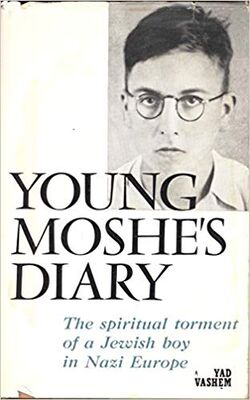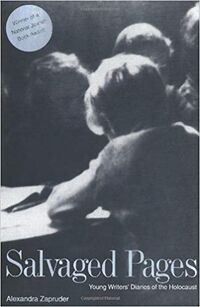Moshe Flinker (M / Netherlands, 1926-1944), Holocaust victim
Moshe Flinker (M / Netherlands, 1926-1944), Holocaust victim.
- KEYWORDS : <Netherlands> <Refugees <Belgium> <Hidden Children> <Deportees> <Auschwitz> <Bergen-Belsen>
- MEMOIRS : Young Moshe's Diary (1958; ET 1965)
Biography
Moshe Flinker (1926-1944) was born in The Hague on October 9, 1926, and was raised in an Orthodox Jewish home. After being subjected to increasingly restrictive anti-Jewish measures following the German occupation of the Netherlands in 1940, the Flinker family fled to Belgium in 1942. In Belgium, Moshe and his family were able to pass as non-Jews with the help of false identity papers and relative anonymity ... Moshe was a deeply religious young boy who grappled with the theological problems posed by the unprecedented persecution of the Jews. He was also a gifted linguist who knew and studied eight languages, including Arabic, which he saw as fundamental to his future life in Palestine ... In April 1944, after being betrayed by a known Belgian Jewish collaborator, Moshe, his mother, and his sisters Esther Malka and Leah, were arrested at their home and deported to Malines. His father, tipped off by a neighbor, prevented Moshe’s four other siblings from going home and arranged for them to find refuge in the Tieffenbrunner orphanage near Antwerp ... Two weeks later, Moshe’s father was caught and sent to Malines, where he found his family. They were all deported to Auschwitz-Birkenau in May 1944. Moshe’s mother, Mindel, was murdered on arrival. Esther Malka and Leah remained in the women’s camp ... Moshe and his father spent several months in Auschwitz-Birkenau before they were transferred to Echterdingen labor camp, where they both contracted typhus. From there, they were sent to Bergen Belsen, where they both succumbed to typhus in January 1945 ... Esther Malka and Leah survived Auschwitz-Birkenau and were reunited with their four siblings in Brussels after the liberation. They all emigrated to Israel.
Book : Young Moshe's Diary (1958; ET 1965)
- Originally published in Hebrew (Jerusalem [Israel]: Yad Vashem, 1958). English ed. Young Moshe's Diary: The Spiritual Torment of a Jewish Boy in Nazi Europe (Jerusalem [Israel]: Yad Vashem, 1965). Also translated in Russian, Dutch, German, French, Italian, and Yiddish.
The diary was written by Holocaust victim Moshe Flinker in the years 1942-1943 (age 15-17), when living in hiding in Brussels, Belgium with his family.
"Moshe Flinker died in Auschwitz but he left copy books describing his innermost thoughts during the fateful days prior to his deportation. His surviving sisters rescued his writings from the cellar of the house in which they had all hid. In his unnatural underground existence he did not fully realize the methodical extermination being perpetrated by the Nazis, but he came very near in a remarkable portrayal of the Jewish situation, which he recorded in January 1943."--Publisher description.
"Moshe Flinker was a sixteen-year-old Jewish boy whose family had fled from Holland to Belgium in an attempt to avoid deportation to the east. During this period of hiding and flight, Moshe was no longer able to go to school or to engage in the activities of normal life. In an attempt to stave off idleness, he decided to begin a diary. Moshe used his diary to record the experiences that his family faced in their struggle to endure Nazi persecution. He also wrestled continuously with the question of why this suffering plagued the Jewish people. On November 30, 1942 he wrote, “Now I return to the question mentioned above and its solution: what can God mean by all that is befalling us and by not preventing it from happening? This raises a further question, which must be settled before we can proceed further with the main problem. This second question is whether our distress is part of the anguish that has afflicted the Jewish people since the exile, or whether this is different than all that has occurred in the past. I incline to the second answer, for I find it very hard to believe that what we are going through today is only a mere link in a long chain of suffering.” Moshe was a deeply religious young man and he sought to understand his present circumstances in the light of biblical history. He looked for insight from the persecutions of the past and longed for God’s promised redemption of the Jewish people. He believed that this deliverance would come when the conditions were right, both in the severity of persecution and in the responses of the victims. Much of his diary was dedicated to this type of analysis. He concluded his November 30th entry with these words, “I should like to pray to the Lord of Israel that He may fulfill in the near future the prayer: ‘Return us unto thee, O Lord, and we shall return; renew our days as of old.’’--Holocaust Center of Florida.
Book : We Are Witnesses (1995), by Jacob Boas
- Jacob Boas, We Are Witnesses: Five Diaries of Teenagers Who Died in the Holocaust (New York, NY: Henry Holt, 1995).
"The five diarists in this book did not survive the war. But their words did. Each diary reveals one voice, one teenager coping with the impossible. We see Dawid Rubinowicz struggling against fear and terror. Yitskhok Rudashevski shows us how Jews clung to culture, to learning, and to hope, until there was no hope at all. Moshe Flinker is the voice of religion, constantly seeking answers from God for relentless tragedy. Éva Heyman demonstrates the unquenchable hunger for life that sustained her until the very last moment. And finally, Anne Frank reveals the largest truth they all left for us: Hitler could kill millions, but he could not destroy the human spirit. These stark accounts of how five young people faced the worst of human evil are a testament, and an inspiration, to the best of the human soul."--Publisher description.
Book : Salvaged Pages, by Alexandra Zapruder (2002)
- Alexandra Zapruder, Salvaged Pages: Young Writers' Diaries of the Holocaust (New Haven, CT: Yale University Press, 2002).
"Presents excerpts from the Holocaust diaries of fifteen young people, ranging in age from twelve to twenty-two, each with an introductory essay that looks at the writer, and the historical context of the diary, with a study of the text and its relevance in the context of Holocaust history or literature. Includes a list of over fifty additional known diaries written by young people during the period."--Publisher description.
External links
- Holocaust Children, 1926 (subject)
- Holocaust Children, Netherlands (subject)
- Holocaust Children Victims (subject)
- Holocaust Children's Diaries (subject)
- Holocaust Refugee Children (subject)
- Holocaust Refugee Children, Belgium (subject)
- Hidden Children (subject)
- Hidden Children, Belgium (subject)
- Deportees (subject)
- Malines (subject)
- Auschwitz (subject)
- Bergen-Belsen (subject)


